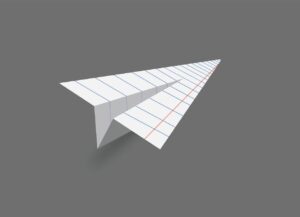
Praxis is a fascinating word, and it’s a fascinating process.
According to the Cambridge Dictionary, the deceptively simple definition of praxis is “the process of using a theory or something that you have learned in a practical way”.
As an example, a student might learn something about aeronautics theory in class, and then spend time folding a paper airplane according to the principles she has learned – weight, lift, drag and thrust. Having done this, she should have a better appreciation of the rules that make something aerodynamic or not.
Whoa, you might say – that’s a pretty big step, from aeronautics theory to paper airplanes. And you would be right, which is why I said that the definition was deceptively simple. It is not usually easy and straightforward to move from something you have learned theoretically to practical action that is directly based on that theory. How would our student know what shape of paper gives the best lift, for example? There’s got to be more to it.
This problem, of connecting theory with praxis, is particularly acute with regards to social justice applications. It’s great to learn all sorts of liberatory theories, but how do they affect how we move through the world, the choices we make, and how we interact with other humans?
In particular, how does our theoretical knowledge of oppressive systems and intersectionality, just to give an example that has been on my mind, translate into identifying our own biases and ways in which we might be oppressing others? Are we being casually ableist or racist, and don’t even notice it?
It’s particularly galling for those of us who have been working on ourselves, when somebody calls us in (hopefully gently) and points out assumptions we may have made about people’s capacity or background. It’s always easier to see when someone else does that!
This is where praxis comes in, I believe. It’s not enough to read books and study theories. We need to go out (either in person or virtually) and interact with real people, take action and speak up when it might be easier not to. We need to work with others to build a better world, and we need to be humble and willing to learn and better ourselves as we go along.
To quote the great Dr. Maya Angelou, “Do the best you can until you know better. Then when you know better, do better.”
The operative word here is Do. Praxis means we are out there in the world, doing, falling, failing, taking chances, making mistakes, getting messy (to quote that other great pedagogue, Miss Frizzle!). It’s better to mess up and learn from your mistakes, than to sit back, secure in your book knowledge, but never getting any better.
Here’s to praxis. May it help us know better every day, so we can do better.
